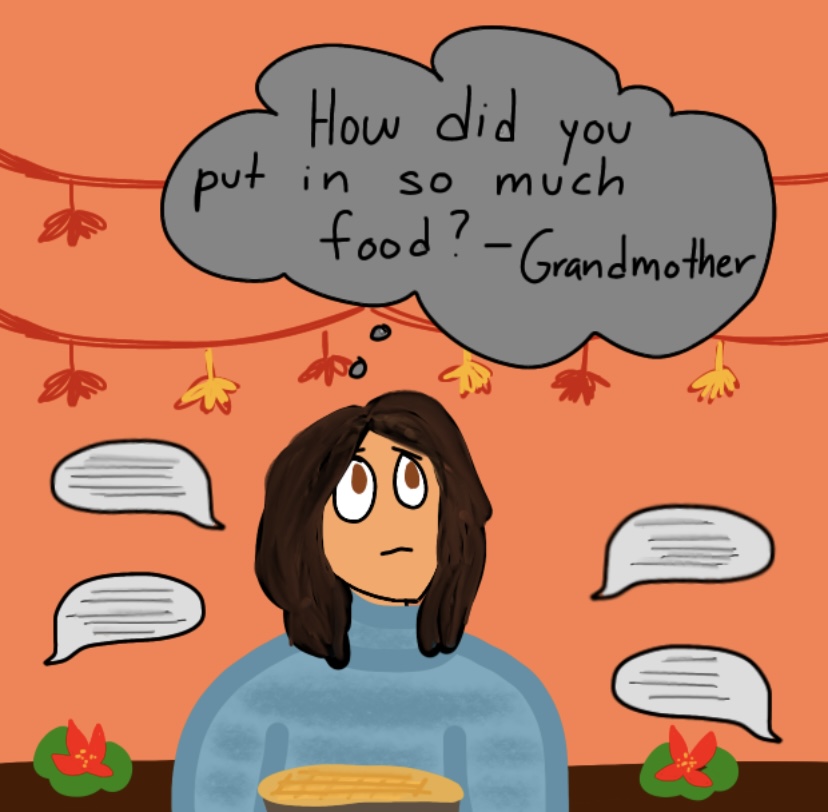Stop Scrutinizing Other People’s Bodies During The Holidays
November 19, 2021
November and December—fall weather turns the air crisp and the leaves on trees turn from summer green to velvet orange. It will soon be winter, and the branches will go bare.
During these months, you cannot go about the day without smelling the pumpkin lattes or candy cane mint. Not only are your senses bombarded with the decadent smells of Thanksgiving and Christmas, but also your social media may also be giving you an adrenaline rush.
Minute by minute, the annual family dinner photos come scrolling down in Instagram posts and you see everyone gathered around the dining room table enjoying turkey or chicken, potato salad, and the other platters of goodies all laid out on the dining room table.
I can imagine myself wrapped in the warmth of the delicious home cooked meal, taking every bite with such delight, until I immediately flash forward to myself staring at my phone’s reflection of my face in January because my dad’s mother just said, “Did you gain weight, mija?”
The question has become a tradition at this point, even more so than eating a comforting apple pie while watching a movie post-Thanksgiving meal each year. Generations of young women in my family are accustomed to swallow this disrespect from other fellow women and are still expected to take this comment as advice.
It is most certainly emphasized during the holidays, especially because of the supposed food consumption, and I can’t say anything back because I’d be deemed disrespectful.
How about you stay away from gouging at my body, Grandmother? The fact that a family member, or anyone for that matter, has the audacity to comment on your body is ridiculous. Furthermore, not only does this thought provoke such offense in a logical manner, it also physically and mentally affects a woman’s view of their body.
Although body shaming isn’t exclusive to the months after Thanksgiving and Christmas or to women, it is equally as harmful as when you would critique a friend who’s trying on a new fit for their cousin’s quinceañera. The mental and physical effects of body shaming come in a variety of conditions, including, but not limited to plummeting self-esteem, body dysphoria, and eating disorders.
Think about it — the women around you may succumb to these sufferings because they believe their body is not presentable to others.
The situation gets into a whole other bucket of hot water when it applies to women who may already be living with a pre-existing condition. Who knows whether the cause was genetic or influenced by outside forces, but the truth is that people, regardless of their persona, do not deserve to be uncomfortable with their body just because someone decided to point out supposed weight gain.
Additionally, race and ethnicity, as well as beauty standards, do almost nothing to support a woman who is feeling ashamed of their body. In America, a porcelain white, thin yet curvy body gets you all the stereotypical reassurance that comes with this “perfection.” But for me, a Latinx woman who may have a body such as the description above, is set in the hypocritical contradiction that lies in the color of my skin.
It doesn’t make sense to scale beauty based on size and color when each and every body is unique to all persons. This not only affects the way people view themselves first, but also influences how they see other’s bodies. All of it is a cause and effect.
This coming Thanksgiving, Christmas, and all the holidays that follow, let us instead celebrate our diversity and acknowledge who we are today. Whatever Grandmother says about bodies isn’t motivation to lose—it’s a motivation to strive for more body positivity.
May the outrageous traditions be broken, and may the new bring a light into joyous times.









 Watch the full video o
Watch the full video o







![Taylor Swift’s newest album titled Midnights 🌙 takes a deeper look at the persona of Taylor herself, and according to reporter Alina Miller, although this isn’t Taylor’s best work, there are highlights worth mentioning about. 💫
Click the link in the bio to check out the full article!
[Photo Caption: Taylor Swift hits all top 10 spots on Spotify’s Billboard Top 100 chart]
#taylorswift #midnights #tiktok #antihero #spotify](https://scontent-iad3-1.cdninstagram.com/v/t51.29350-15/314744727_1556543814822641_1643591421920256829_n.jpg?_nc_cat=110&ccb=1-7&_nc_sid=8ae9d6&_nc_ohc=aDxNzq2snTYAX_gAl0G&_nc_ht=scontent-iad3-1.cdninstagram.com&edm=ANo9K5cEAAAA&oh=00_AfBa4EluVzZT-7d5rKyT6tLJo0UJuCvRJPSCMX71aeO38Q&oe=63965890)



 Watch the full video
Watch the full video 
